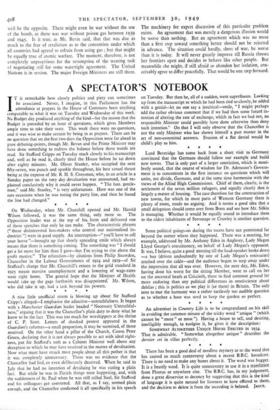A nice little unofficial storm is blowing up about Sir
Stafford Cripps's alleged—I emphasise the adjective—untruthfulness. It began with a Manchester Guardian leader headed " Necessary Untruthful- ness," arguing that it was the Chancellor's plain duty to deny what he knew to be the fact. This was too much for worshippers at the shrine of C. P. Scott. Letters of shocked protest appeared in the Guardian's columns—a small proportion, it may be surmised, of those received. On the other hand a pillar of the Church, Canon Peter Green, declaring that it is not always possible to act with ideal right- ness, put Sir Stafford's oath as a Cabinet Minister well above any deception to which he may have resolved in the matter of devaluation. Now what must have struck most people about all this pother is that it was completely unnecessary. There was no evidence that the Chancellor had lied, or even deliberately deceived. When he said in July that he had no intention of devaluing he was stating a plain fact. But while he was in Zurich things were happening, and, with the suddenness of St. Paul when he was still called Saul, Sir Stafford and his colleagues got converted. All that, as I say, seemed plain enough, and the Chancellor confirmed it all specifically in his speech
on Tuesday. But then he, all of a sudden, went superfluous. Looking up from the manuscript to which he had been tied so closely, he added with a genial—let no one say a jesuitical—smile, " I might perhaps add the rather obvious comment that if we had then some future in- tention of altering the rate of exchange, which in fact we had not, no responsible Minister could possibly have done otherwise than deny such intention." On that I will only observe that the Chancellor is not the only Minister who has shown himself a past master in the art of non-committal answers. Evasion of a flat denial would be child's play to him.














































 Previous page
Previous page